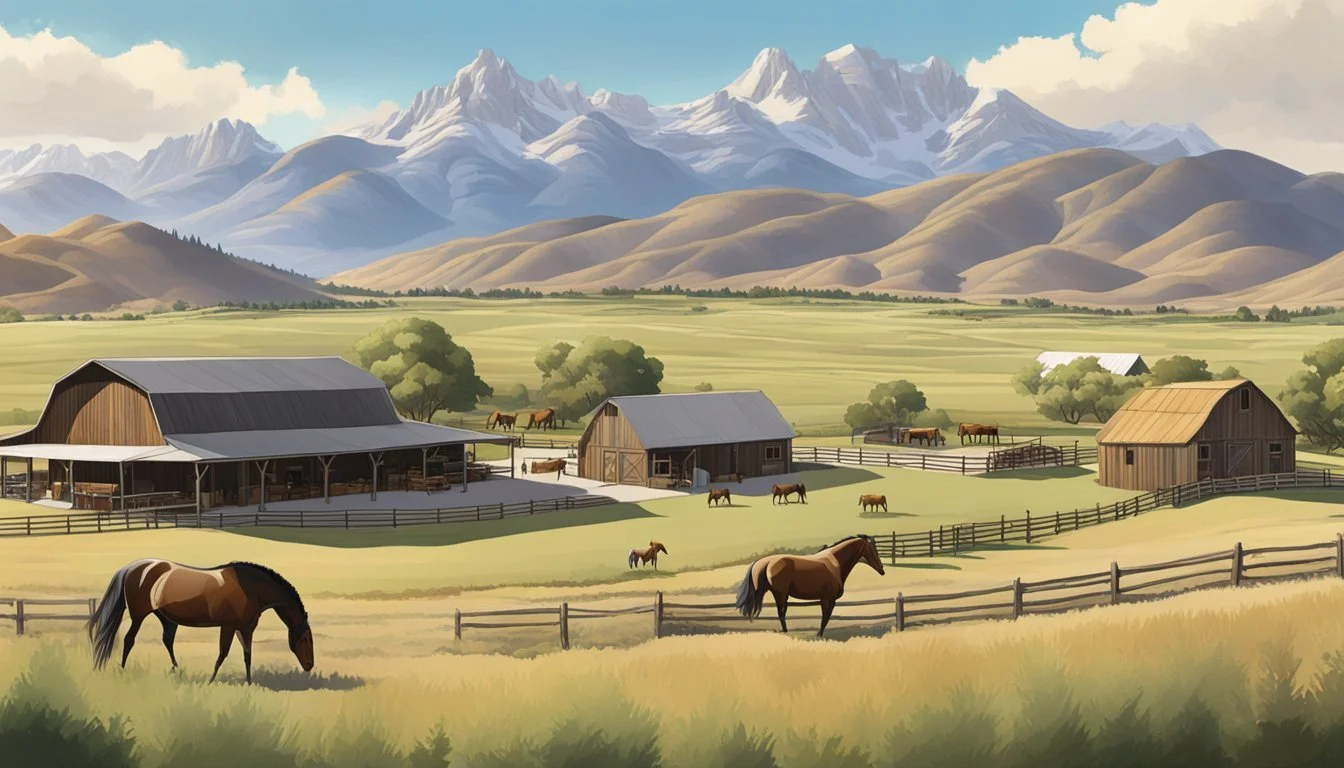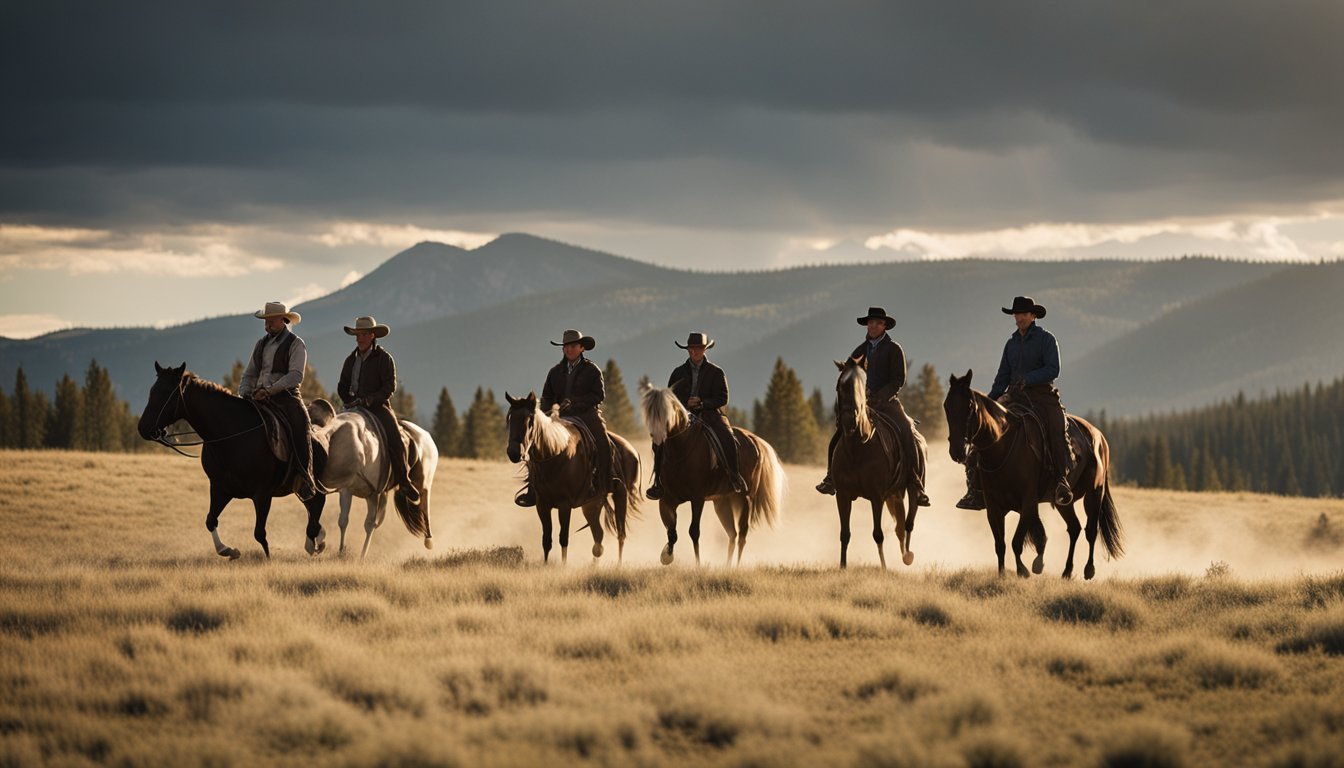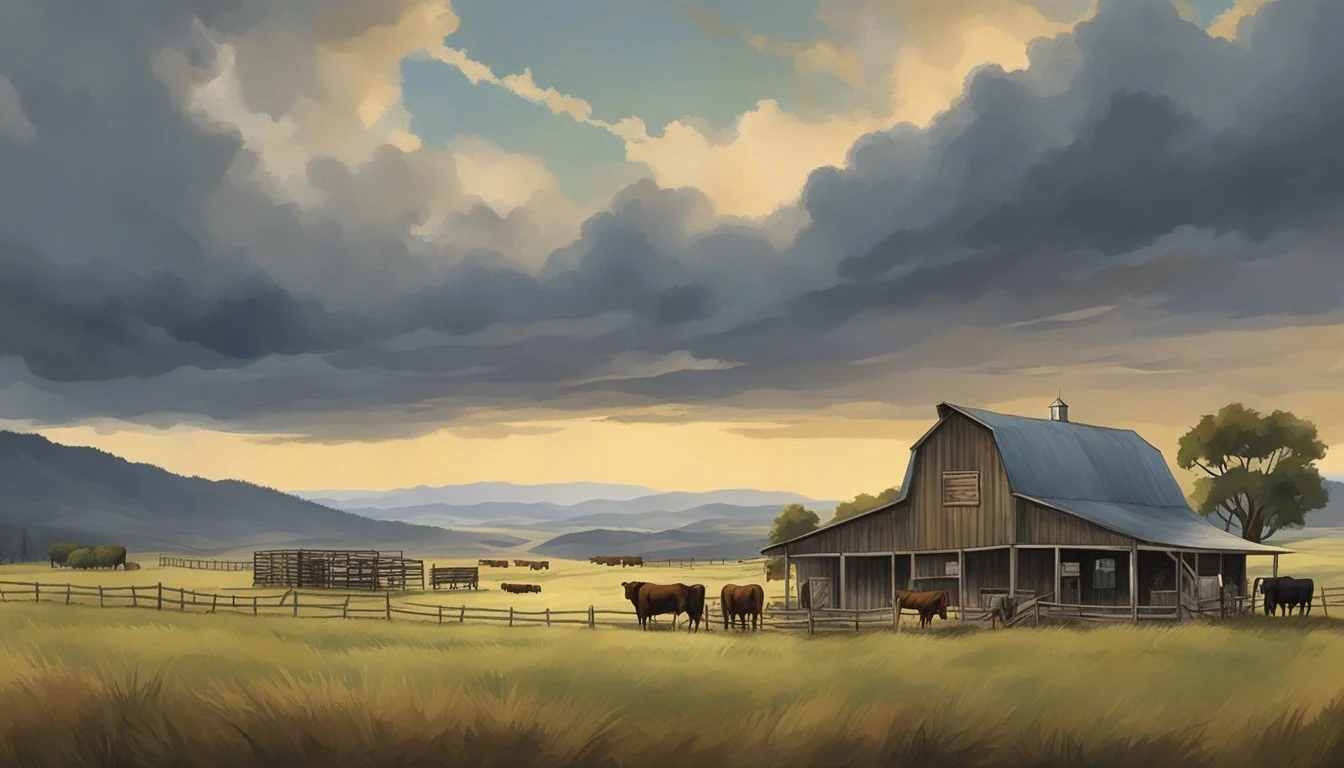John Dutton's Shocking Decision to Sell Yellowstone Ranch Could Destroy Montana!
The iconic Yellowstone Dutton Ranch has been at the heart of the Dutton family saga for generations. John Dutton's unwavering commitment to preserving his ancestral land has driven much of the conflict in the hit series Yellowstone. If John Dutton decided to sell the ranch, it would fundamentally alter the course of the show and the legacy of the Dutton family.
Selling the Yellowstone ranch would have far-reaching consequences beyond just the Dutton family. The land holds immense value, both financially and culturally. Potential buyers have offered hundreds of millions of dollars for the property, recognizing its strategic importance and natural resources. The sale would likely spark intense competition between corporate interests, real estate developers, and possibly even the local Native American tribe.
John Dutton's decision to sell would represent a seismic shift in his character and values. Throughout the series, he has fiercely defended the ranch against all threats, viewing it as his life's purpose and family legacy. A choice to sell would signal a profound change in John's priorities and potentially fracture relationships within the Dutton family.
Historical Significance of the Dutton Ranch
The Dutton Ranch holds immense historical importance, tracing its roots back to the late 19th century. Its founding and expansion mirror the development of the American West, while its cultural impact has shaped Montana's identity.
Founding and Expansion
The Dutton Ranch was established in 1883 by James Dutton, who led his family westward in search of new opportunities. The journey, depicted in the series "1883," was fraught with danger and hardship. Upon arrival in Montana, the Duttons claimed a vast tract of land near Yellowstone National Park.
Over the decades, the ranch expanded through strategic acquisitions and hard work. The Dutton family's resilience in the face of harsh winters, economic challenges, and conflicts with neighboring landowners allowed them to build one of the largest ranches in Montana.
Cultural Impact
The Dutton Ranch has become a symbol of the American frontier spirit and the enduring legacy of ranching families in the West. Its presence has significantly influenced Montana's cultural landscape, preserving traditional ways of life and land management practices.
The ranch has played a crucial role in local economies, providing employment and supporting surrounding communities. Its vast acreage has also served as a buffer zone for wildlife habitats, contributing to conservation efforts in the region.
The Dutton family's struggles and triumphs, particularly those of characters like Elsa Dutton in "1923," have become part of Montana's folklore. Their stories reflect the broader narrative of settlers who shaped the American West through determination and sacrifice.
John Dutton's Relationship with the Ranch
John Dutton, portrayed by Kevin Costner, has deep personal and familial ties to the Yellowstone Dutton Ranch. His connection to the land goes beyond mere ownership, shaping his identity and driving his actions throughout the series.
Personal Ties
The Yellowstone Dutton Ranch holds immense sentimental value for John. It was founded by his great-great-grandfather James Dutton, who established the homestead in Montana. This legacy has been passed down through generations, instilling a sense of duty and pride in John.
He views the ranch as an extension of himself and his family's heritage. The land represents more than just property; it embodies the Dutton family's history, struggles, and achievements.
John's attachment to the ranch is evident in his refusal to sell, even when faced with lucrative offers. This decision stems from his belief that the land is priceless and irreplaceable.
Leadership and Legacy
As the current patriarch, John Dutton shoulders the responsibility of preserving the ranch for future generations. His leadership style is shaped by the challenges of maintaining such a vast property in modern times.
John faces numerous threats to his ownership, including development pressures and potential inheritance tax burdens. These challenges drive his actions in season 5 and throughout the series.
He is determined to protect the ranch at all costs, often resorting to controversial methods. John's leadership extends beyond the property lines, influencing local politics and business dealings.
The ranch's fate weighs heavily on John's mind as he considers his children's roles in its future. He grapples with the question of who will inherit the land and continue the Dutton legacy.
Economic Factors in Selling the Ranch
The potential sale of the Dutton Ranch would involve complex economic considerations. Market dynamics, regional impacts, and tax implications all play crucial roles in such a significant land transaction.
Market Value and Potential Buyers
The Dutton Ranch's market value likely exceeds $500 million, based on previous offers mentioned in the series. Large corporations, real estate developers, and wealthy individuals could be potential buyers.
Conservation groups might also show interest, aiming to preserve the land's natural beauty and ecological importance.
The ranch's size, location, and resources make it a highly coveted property. Its value extends beyond mere acreage, encompassing water rights, mineral rights, and development potential.
Impact of Land Deals on the Local Economy
A sale of the Dutton Ranch would significantly affect the local economy. The influx of capital could boost investment and create new job opportunities in the region.
However, it might also lead to changes in land use, potentially altering the area's character and traditional economic activities.
The deal could influence property values in surrounding areas. Neighboring ranches might see increased interest from buyers looking to capitalize on the region's growing appeal.
Local businesses could experience shifts in customer base and demand for services, depending on the new owner's plans for the property.
Inheritance Tax Considerations
Estate taxes pose a substantial challenge for large landowners like the Duttons. The value of the ranch could trigger significant tax liabilities upon inheritance.
Selling parts of the property might be necessary to cover these taxes, potentially breaking up the ranch. This scenario often forces families to make difficult decisions about their legacy.
Strategic planning, such as setting up trusts or conservation easements, could help mitigate tax burdens. However, these options may also limit future use or development of the land.
The Duttons' ability to retain the ranch intact for future generations hinges on careful financial planning and navigation of complex tax laws.
Political Implications of the Sale
The potential sale of the Yellowstone Dutton Ranch would have far-reaching political consequences in Montana. It would reshape relationships with local indigenous groups and impact the state's political landscape.
Negotiations with Thomas Rainwater and the Broken Rock Tribe
Thomas Rainwater, as Chief of the Broken Rock Reservation, would likely seek to reclaim ancestral lands if the Dutton Ranch went up for sale. This could lead to complex negotiations between the tribe and potential buyers. The Broken Rock Tribe might leverage their historical claim to the land to gain a favorable position in any deal.
Rainwater could use his political influence to lobby for the reservation's interests. He might seek state or federal support to assist in purchasing parts of the ranch. This would potentially expand the Broken Rock Reservation's territory and economic opportunities.
The sale could also impact existing agreements between the Duttons and the tribe. New ownership might need to renegotiate water rights, land use, and other critical issues affecting both parties.
Influence of Jamie Dutton's Position
Jamie Dutton's role as Attorney General of Montana would be crucial in the ranch's potential sale. His position gives him significant influence over legal aspects of large land transactions in the state. Jamie could use his authority to either facilitate or hinder the sale process, depending on his personal motivations and political alliances.
His insider knowledge of both the ranch's operations and state regulations could prove valuable to potential buyers or opponents of the sale. Jamie might face pressure from various political factions to sway the outcome in their favor.
The sale could also impact Jamie's political career. His handling of the situation could either strengthen or weaken his position within the state government. It might affect his relationships with other political figures and influence future elections.
Character Dynamics and Reactions
John Dutton's decision to sell the ranch would trigger intense reactions from his family and allies. Each key character would grapple with the potential loss of their livelihood and identity in unique ways.
Beth Dutton's Opposition
Beth Dutton, John's fiercely loyal daughter, would likely vehemently oppose selling the ranch. Her entire life has been dedicated to protecting the family legacy. Beth would employ her sharp business acumen and ruthless tactics to prevent the sale at all costs.
She might leverage her corporate connections to find alternative financial solutions. Beth could also attempt to manipulate or intimidate potential buyers to back out of any deals.
Her relationship with Rip Wheeler could become strained if he considers accepting the change. Beth's opposition might create conflict with her siblings who may be more open to selling.
Kayce's Loyalties and Vision
Kayce Dutton would face a complex dilemma if his father decided to sell the ranch. As the most likely heir to the Yellowstone, Kayce might see potential benefits in letting go of the burdensome property.
He could view the sale as an opportunity to forge a new path for his own family, away from the constant conflicts surrounding the ranch. Kayce's military background and adaptability might make him more open to change.
However, his deep connection to the land and Native American heritage could also compel him to find alternative solutions. Kayce might propose selling only part of the land or forming partnerships with local tribes to maintain control.
Rip Wheeler's Place Without the Ranch
Rip Wheeler's entire identity is tied to the Yellowstone ranch. A potential sale would leave him facing an uncertain future and questioning his role in the Dutton family.
As the ranch foreman and John's most trusted ally, Rip might initially resist the idea of selling. He could work tirelessly to find ways to keep the ranch operational and profitable.
If the sale became inevitable, Rip would need to reevaluate his relationship with Beth and his place in the family. He might consider following the Duttons to a new venture or striking out on his own for the first time in his life.
Cultural and Environmental Impact
The potential sale of the Dutton ranch would have far-reaching consequences for Montana's cultural heritage and natural environment. This decision could alter the landscape and way of life that have defined the region for generations.
Role of the Ranch in Preserving Western Heritage
The Dutton ranch serves as a living museum of Western culture. It preserves traditional ranching practices, including cattle drives and horseback riding. Cowboys still work the land using time-honored techniques, maintaining a connection to America's frontier past.
The ranch also safeguards historical sites and artifacts. These include Native American landmarks and remnants of early settler homesteads. By keeping the land intact, the Duttons protect these irreplaceable cultural resources from development or neglect.
Local communities benefit from the ranch's presence. It provides jobs and supports businesses that cater to the ranching industry. The property's vast open spaces contribute to Montana's iconic scenery, attracting tourists and boosting the local economy.
Environmental Consequences of Land Development
Selling the ranch could lead to significant ecological changes. Developers might divide the land into smaller parcels, disrupting wildlife habitats and migration patterns. Species that rely on large, uninterrupted territories could face population declines.
Land conversion for residential or commercial use would increase water consumption. This could strain local water resources, affecting both human communities and natural ecosystems. Paved surfaces would replace grasslands, altering soil composition and increasing runoff.
Cattle grazing, when managed sustainably, can maintain grassland health. Without proper land stewardship, invasive plant species might spread, reducing biodiversity. The loss of grazing land could also push cattle production to less suitable areas, potentially causing overgrazing elsewhere.
Possible Future of the Property
The Yellowstone Dutton Ranch's potential sale opens up intriguing possibilities for its future. New ownership could dramatically alter the property's trajectory, while connections to the existing storyline may be maintained. Taylor Sheridan's expanding universe presents opportunities for spinoffs centered around the ranch's fate.
Concepts for New Ownership
A sale to Thomas Rainwater and the Broken Rock Reservation emerges as a compelling option. This transfer would honor the land's indigenous heritage while preserving its natural beauty. Alternatively, the ranch could be transformed into a nature preserve or national park, ensuring public access and environmental protection.
Corporate ownership might lead to development, potentially including luxury resorts or sustainable farming initiatives. A consortium of local ranchers could band together to maintain the property's traditional use, preserving Montana's ranching culture.
Continuity with the Yellowstone Storyline
The ranch's new owners would likely face similar challenges that plagued the Duttons. Conflicts with developers, environmental concerns, and political pressures would persist. Key characters from the original series might remain involved as advisors or antagonists.
The Dutton family's influence could continue through legal agreements or conservation easements attached to the sale. This would allow for ongoing storylines involving the family's attempts to shape the ranch's future from afar.
Speculative Spinoffs and the Taylor Sheridan Universe
A spinoff focused on the new owners' struggles to manage the vast property could captivate audiences. This series might explore themes of cultural preservation, environmental stewardship, or the clash between tradition and progress.
Another potential spinoff could follow the Duttons as they adjust to life away from the ranch. Their efforts to reclaim their legacy or build a new one elsewhere would provide rich storytelling opportunities.
Taylor Sheridan's knack for interconnected narratives could see characters from other series in his universe crossing paths with the ranch's new stewards. This approach would expand the Yellowstone saga while introducing fresh perspectives and conflicts.
Concluding Thoughts
John Dutton's hypothetical decision to sell the Yellowstone Ranch would have far-reaching consequences for the family and Montana. This choice would reshape the series' narrative and the characters' futures in profound ways.
Evaluating the Duttons' Decision
Selling the ranch could be seen as both a pragmatic move and a betrayal of the Dutton legacy. The family might avoid ongoing conflicts with developers and financial pressures. However, they would lose their ancestral home and power base in Montana.
The sale could fulfill the 1883 prophecy, suggesting the land's return to its original stewards. This outcome might bring a sense of karmic justice and closure to the Dutton saga.
In the series finale, Kayce and Beth make a similar choice to protect their home. They sell the ranch to Thomas Rainwater at a historically fair price. This decision honors their heritage while securing a future for the land.
The impact on Montana's landscape and economy would be significant. The ranch's fate could determine whether the region remains a bastion of the Old West or transforms into a modern development.







